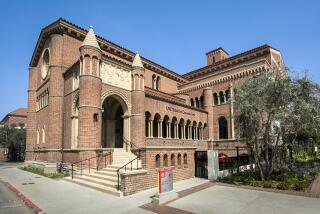USC acts by popular demand
- Share via
USC’s Thornton School of Music will make room starting next year for singers and instrumentalists who play pop music, breaking a long-standing tradition in higher education that requires students to dedicate themselves either to classical music or jazz.
Today the school is announcing its new bachelor of music degree in pop music performance, said to be the first of its kind at a major university.
“Why shouldn’t a program like this start in Los Angeles?” said Robert Cutietta, dean of the Thornton School. “I’ve been in higher education for 20-some years, and it’s been talked about, but everyone has been afraid to do it. No one wanted to be first.”
The thrust of the new program, which is overseen by associate dean Chris Sampson, is to provide a place for instrumentalists or vocalists whose passion is popular music -- be it rock, R&B;, folk, blues or country. Although other institutions grant degrees to those who study pop music as a cultural force, this is billed as the first bachelor’s degree available to those who perform it.
Students still will be required to study music theory, history and songwriting, but they’ll also learn about entertainment law, record promotion, marketing, publicity and other fields pop musicians need to understand to succeed in the evolving music business.
“We built this program recognizing that the nature of the music business is changing,” Sampson said in a separate interview. “We’re looking to create a broader number of opportunities for our students to successfully make careers in music. Turning out records that end up making the charts, that’s the top of a broad pyramid. I expect other students might find their way into becoming music directors, arrangers and a variety of different roles.
“The whole idea is that we’ll be bring it all together under one umbrella. . . . We are building a network of people in different disciplines, whether in technology, business or law . . . and within a college atmosphere, students will have some room to experiment.”
Cutietta and Sampson both speak from personal experience, Cutietta as an electric bassist, Sampson as a rock drummer. Neither discipline was recognized at the university level when they were students.
“I worked in high school as a rock drummer on the East Coast,” Sampson said. “I wanted to attend college and be in a university environment, but there was no outlet for me. I hurriedly taught myself classical guitar in my junior year of high school and pulled it off and was accepted. But I had to settle by getting degrees in classical guitar performance. I was not pursuing exactly the area I was interested in. And for somebody who wants to be a lead singer in a band, a classical voice program where they learn operatic arias may not be meeting their objectives.”
And the other music faculty members at USC? Any grumblings about Beethoven rolling over in his grave when “Stairway to Heaven” starts emanating from Jimmy Page wannabes in practice rooms?
“I give the faculty here so much credit because the most elevated classical music people have embraced this concept,” Cutietta said. “I’ll be honest -- I expected some resistance, and there hasn’t been any. We assured them this would be extremely high quality.”
Auditions will take place in January, and Sampson said he expected to start with a class of 15 to 20 pop music performance majors. The key difference, he said, in structuring a course of study for those delving into popular music versus those studying longer-established forms such as classical music and jazz is the more fluid nature of the music.
So USC has consulted with Randy Newman, Steve Miller, superstar producer Glen Ballard and others in developing the degree components.
The still developing faculty will include hit songwriter-producer Lamont Dozier, drummer Peter Erskine, guitarist Richard Smith, drummer Ndugu Chancler and pianist-singer Anne Farnsworth. Students will be required to take a year of drums -- not because it was Sampson’s original instrument of choice but to emphasize the critical role that beat and groove play in pop music.
What of the potential danger of institutionalizing a type of music created in large part by youths railing against the adult world? What would Chuck Berry or Johnny Rotten say about someone earning a college degree in rock guitar?
“That’s a great question,” Sampson said. “I think they would ultimately have a fear that this music, which is rooted in rebellion and in statements against the establishment, is now part of the establishment. “I thought long and hard about that. Our trick as faculty members is to create a learning environment for these students, and to be able to lay in front of them goals to keep them stretched and to improve their skills, without superimposing what we think defines popular music.”
In fact, Sampson said the faculty will determine what to teach based on what the students hope to accomplish, rather than starting with a predetermined set of courses and skills each one must master.
“This type of program might not be for every musician,” Sampson said. “I understand what a Bob Dylan or Lou Reed might say, and that might continue to be said. . . . But we aim to keep in mind what made this music great to begin with and not to be overly clinical and not sterilize it to the point where it can no longer be recognized. We’re determined to keep the vitality and energy in it.”
--
More to Read
The biggest entertainment stories
Get our big stories about Hollywood, film, television, music, arts, culture and more right in your inbox as soon as they publish.
You may occasionally receive promotional content from the Los Angeles Times.










